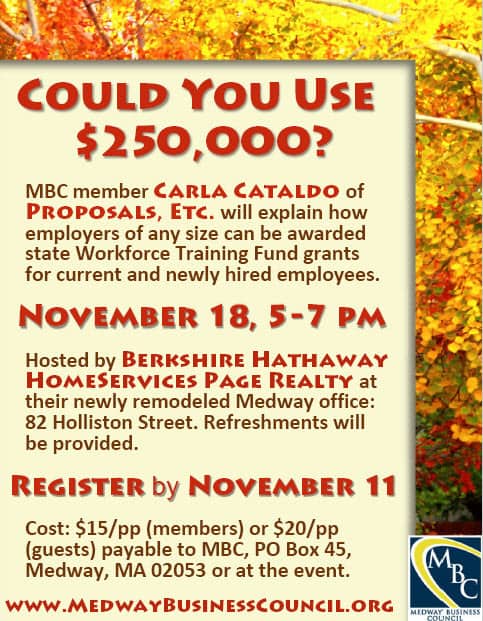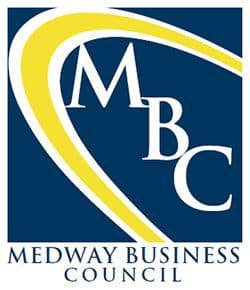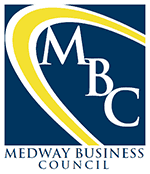Could You Use $250,000? – Nov 18, 2015
How Employers Can Access MA Workforce Training Fund Grants to Train Employees
Are small and medium-sized companies leaving money on the table when it comes to training their employees? Last year, the Commonwealth of MA distributed $14.5 million in workforce training funds — but more sat untouched. Drawing on unemployment taxes paid in, the state offers a large pool of funds to employers for training workers — to increase productivity, improve competitiveness in the marketplace, decrease turnover, and create new jobs. Desired results for employees are job retention, job growth, or increased wages.
Plenty of these Workforce Training Funds remain untapped because many companies either don’t know the funds exist or feel daunted by the application process. Carla Cataldo, M.P.P., of Proposals, Etc., outlined how companies can access them to train employees at the November Medway Business Council meeting, held at the Berkshire Hathaway HomeServices Page Realty office.
Profitability doesn’t prohibit a company from receiving the funds, nor does their size — as long as the company lacks the capacity to provide the training itself (the training is done by an outside, approved provider) and the company can match the value of the training dollar-for-dollar. Eligible businesses must also pay unemployment insurance, owe no taxes, and have a valid Workers’ Compensation policy and Board of Directors listed with the MA Secretary of State.
Applications must stress the benefits of training to the company in clear metrics: for example, expected dollar amounts of increased sales, changes in production time, or trainees’ pay increases. Follow-up reports on the program once training has been done must measure results against the projected outcome. The funds are applicable towards training workers at all skill levels. The Workforce Training Fund Program focuses on improving the skills and take-home pay of “low-wage” workers, whose weekly wage is measured at less than 50% of the average weekly wage in a given year. In 2013, low-wage was defined at around $14.50/hour.
Among the materials needed for the Workforce Training Fund application are a written proposal, budget, and return-on-investment statement; income and balance statements, two fiscal years’ worth of financial statements, a letter of union support if the workforce is unionized, and a quote and course descriptions from a training provider. While the receipt of WTF grants is public information, the financial records of the applicants are not open to the public.
Training programs come in several different levels. Short-term “Express Grants” are for companies of 100 or fewer employees and expressly aim to improve skill levels, up to $3K per employee. General Technical Assistance grants offer from $5K-$25K and help a group of employers or employees determine a set of training needs to prepare for a General grant, while the largest type of grant, Workforce Training Fund General Grants up to $250K, may be used to train existing or new employees in a variety of areas.
Assistance to companies that would like to apply but aren’t sure where to begin is available from consultants such as Cataldo, who is an experienced proposal writer, or from approved training vendors who may also offer this service.
To learn more about Medway Business Council and other upcoming events, visit medwaybusinesscouncil.org.
View other posts




